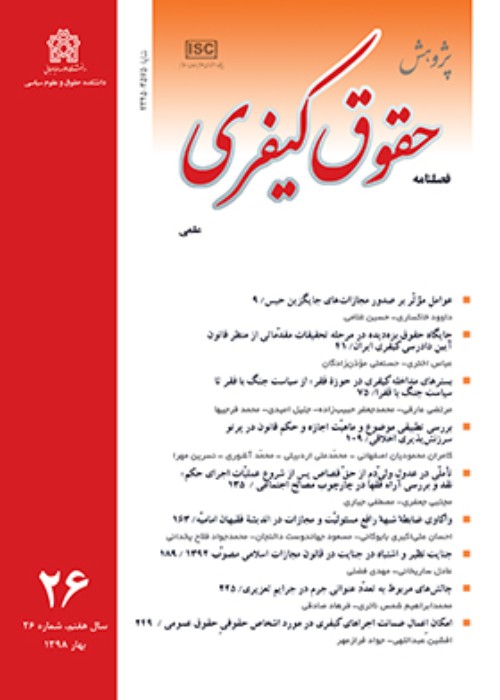Fundamental changes in the law on reducing the punishment of imprisonment in the preliminary investigation process
The approach to incarceration is as old as history itself. However, as societies have developed, fundamental ambiguities have emerged in this approach. Consequently, following the knowledge of criminology, custodial sentences have been seen as inadequate in reducing crimes, preventing recidivism, and addressing the growing number of individuals in the criminal population. These factors have given rise to the de-incarceration movement, which has gained strength in response to the disadvantages of imprisonment; mainly its effects after individuals are released from prison. Thus, the use of alternatives to imprisonment has been embraced in the Islamic Criminal Law approved in 2013, where its scope, types, and formal rules were outlined in the Criminal Procedure Law of the same year. Subsequently, sub-legislative measures were formulated and communicated to the judicial authorities to implement this punishment.Nevertheless, the success of the de-incarceration movement in reducing the number of incarcerated individuals and addressing issues such as the severity of punishment has been a significant obstacle to the release of prisoners. In response to this problem, the de-incarceration movement approved the law on reducing prison sentences in 2020. Since enacting such substantive laws can have a crucial impact on issues raised in criminal proceedings, the effect of their approval in the judicial process cannot be ignored.This article has been written descriptively to study the significant changes this law has brought to the preliminary investigation process. The effectiveness of this law in achieving criminal security orders for the accused, in line with the principle of proportionality and the principle of criminal law as the last and least resort, remains ambiguous. In this regard, the question arises as to whether the principle of criminal law as the last and least resort should be incorporated in obtaining the order of criminal security or not. Furthermore, considering the development of forgivable crimes, which indicates a move towards the privatization of criminal justice, the issue arises as follows: According to Article 106 of the Islamic Penal Code, in the case of forgivable crimes, the victim has the right to file a complaint within one year from the date of crime notification. Therefore, after one year, the victim's right will expire. Given the wide range of crimes categorized as forgivable crimes in the law on reducing the punishment of imprisonment, in a situation where the victim has not yet filed a complaint due to the crime being non-forgivable, the question arises as to whether the judge should issue a suspension of prosecution according to Article 11 of the Islamic Criminal Law or consider the plaintiff's acquired rights and allow the continuation of the prosecution process.Determining the jurisdiction of judicial authorities or institutes is another challenge this law presents. For instance, in cases of criminal damage, the property's value plays a role in determining the authorities' jurisdiction. This means that when the property damage is up to ten million Rials, according to Article 9 of the Conflict Resolution Counsel Act, it falls within the jurisdiction of the Council. If the damage exceeds ten million Rials but is less than twenty million Rials, it directly falls under the jurisdiction of the Criminal Court. If the damage is less than 100 million Rials, the prosecutor's office has the authority over the preliminary investigation. Therefore, the absence of an authority to accurately determine the extent of the damage causes delays in proceedings and creates uncertainty for the judicial authorities. To prevent divergent judicial opinions and adhere to the principle of the generality of criminal procedure, as specified in Article 2 of the Criminal Procedure Law, it seems necessary to issue unanimous opinions regarding the challenges above. This will end these judicial disputes and establish a unified procedure within the judicial authorities. Consequently, when approving substantive regulations, their effectiveness should be evaluated compared to formal regulations to prevent the division of judicial opinions.
- حق عضویت دریافتی صرف حمایت از نشریات عضو و نگهداری، تکمیل و توسعه مگیران میشود.
- پرداخت حق اشتراک و دانلود مقالات اجازه بازنشر آن در سایر رسانههای چاپی و دیجیتال را به کاربر نمیدهد.


